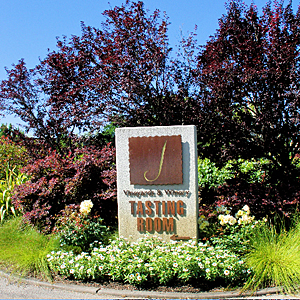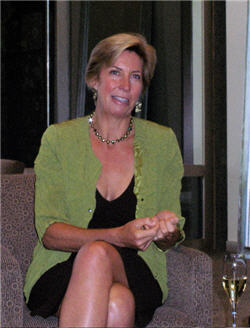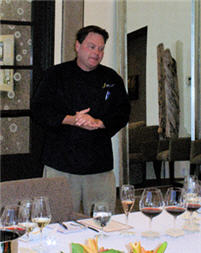

Once primarily known for its sparkling wine, J Vineyards and Winery has greatly expanded its portfolio to include fine still wines with an emphasis on how their pair with food.
THE ABCS of J
by
Rosina T. Wilson
July 27, 2009
 escribing the effects of ancient volcanoes, deep tectonic upheavals, and even a change in direction of the river itself, Judy compared “the twenty or so distinct soil types we have in this small valley” to those of other great winegrowing areas. “Burgundy? – I love it to pieces, but they’re working with only 5 to 10 different soil types. Our vineyards span the length of the Russian River appellation, and every one is completely different. As a geologist, (referring to her Stanford degree), I’m in rock heaven here, because there’s so much diversity in our soils.”
escribing the effects of ancient volcanoes, deep tectonic upheavals, and even a change in direction of the river itself, Judy compared “the twenty or so distinct soil types we have in this small valley” to those of other great winegrowing areas. “Burgundy? – I love it to pieces, but they’re working with only 5 to 10 different soil types. Our vineyards span the length of the Russian River appellation, and every one is completely different. As a geologist, (referring to her Stanford degree), I’m in rock heaven here, because there’s so much diversity in our soils.”
In 2006, Judy brought in veteran winemaker George Bursick, along with master viticulturist John Erbe, to optimize the many variables of grape growing and

J Vineyards and Winery owner, Judy Jordon
In the vineyard, these include highly varied clonal selections (14 for Pinot Noir and 10 for Chardonnay), rootstocks (9), and trellising methods, in addition to the disparate soils and microclimates. Harvest takes place at night to keep the fruit cool, and different vineyard lots are often kept separate to preserve their distinct characteristics.
In the winery, George Bursick – a specialist in wine “mouthfeel” or what he calls “wine body” – continues to develop the wine’s complexity further. He includes in his Pinot Noir program, for example, “fermentation variables such as using indigenous as well as rare, exotic yeast and malolactic strains, specific punch-down regimens, slow and extended fermentations,” all designed to expand the wine’s flavor even more.
A vineyard visit was next on our agenda, so we headed uphill in four-wheel-drive mode, with John Erbe and assistant winemaker Hollis Price. Our destination: the postcard-pretty Nicole’s Vineyard, with its sweeping views of the valley. Named for Judy Jordan’s teenaged daughter, the 42-acre site represents J’s “crown jewel” of Pinot Noir. Its deep, well-drained Arbuckle soil, a reddish sandy loam, makes for rich, concentrated fruit. And although daytime temperatures here can be rather high, afternoon winds and fog cool the vineyard enough to keep the fruit’s components in balance.
With a glass of Nicole’s Vineyard Pinot in hand, we looked closely at the vines with John and Hollis. John pointed out the north-south orientation of the vineyard rows, showing us how he treats the two sides differently. On the west face of the vines, he lets the leafy canes grow horizontally to shade the grape clusters from strong afternoon sunlight, whereas on the east side, he lifts the canes straight up to let in the gentler morning rays.
John and Hollis told us of J’s recent acquisition of three new vineyard properties, describing one with angled northeast-southwest exposure where the hot afternoon sun hits the west side of the vines later in the day. They also spoke of planting a new assortment of Chardonnay clones, to add increased flavor potential to that vineyard’s finished wines.
Mastering the Wine and Food Connection
It’s well known that one great benefit of producing still wines in addition to sparklers is having a broader “flavor palette” to pair with food. Many wine-and-food professionals, in fact, view the type of complex flavors that the J team builds into their wines in the same way that chefs view their herbs and spices: as seasonings that enhance the overall effect.This is very much in keeping with the plan that Judy Jordan set in motion when the Visitor Center was established, launching Sonoma County’s first program to

An often-overlooked feature of sparkling wine, whether it’s French Champagne, Spanish Cava, Italian Prosecco or quality California bubbly, is its remarkable ability to partner with a tremendous variety of foods. Champagne and caviar, sure. Oysters, shrimp, smoked salmon.
But sparklers can, just as readily, work with things you’d never expect: Sushi, tacos, fried chicken. Potato chips, cheese puffs, even popcorn(!) And although most people equate bubbly with pre-dinner toasting only, it can truly hold its own throughout a complete meal.
In fact, except perhaps for very spicy or very sweet foods, there’s a style of sparkling wine for just about any dish. Taking this a step further, I’ve long believed that sparklers can be the answer for wine lovers in situations that would otherwise call for beer!
Why? Because of some basic characteristics of bubbly that other wines simply lack. The bubbles themselves, for one. Obvious though this may seem, effervescence (in sparkling wine, beer, even seltzer and sodas) works wonders to scour away heavy, fatty flavors and refresh your palate for the next bite.
 Sparkling wines also tend to be more acidic than still wines, given that the grapes are harvested before they’re fully ripe. (Think how sour an unripe apple can be!) This tanginess, though, helps make the wine more refreshing and more food-friendly. Having a sip of bubbly with a bite of chicken in cream sauce, for instance, can seem almost like squeezing some lemon on it to balance out the richness of the dish.
Sparkling wines also tend to be more acidic than still wines, given that the grapes are harvested before they’re fully ripe. (Think how sour an unripe apple can be!) This tanginess, though, helps make the wine more refreshing and more food-friendly. Having a sip of bubbly with a bite of chicken in cream sauce, for instance, can seem almost like squeezing some lemon on it to balance out the richness of the dish.
Although few realize it, most sparkling wines, even those labeled “Brut,” have a noticeable amount of sweetness to counteract the high acidity. (“Brut” sparklers, in fact, can have as much as 1.5% sugar.) This helps the wine pair better with foods that are slightly sweet, somewhat salty (I call this the “peanut butter and jelly effect”), and even mildly-to-moderately spicy (the “chutney and curry effect”).
Why not give a good sparkling wine a try, the next time you serve Szechwan chicken, chile verde, baked ham, pad Thai, barbecued ribs, or any other dish that’s considered hard to pair with wine. Decent examples at very affordable prices are easy to find. The flavors of the food and bubbly together will probably surprise you quite pleasantly. And as a bonus: your everyday meal, punctuated by popping corks and cheerful bubbles, will suddenly seem like a party!
~RTW
Judy sought out Mark Caldwell, a California Culinary Academy graduate and experienced winery chef, to develop creative, seasonal menus that showcase the

J Winery’s chef, Mark Caldwell, explains how he paired his
 READER FEEDBACK: To post your comments on this story,
click here
READER FEEDBACK: To post your comments on this story,
click here
Print this article | Email this article | More about Russian River Valley | More from Rosina T. Wilson













